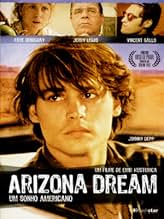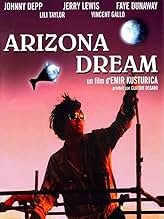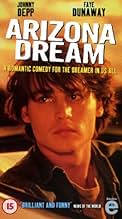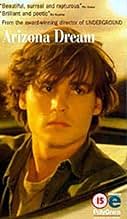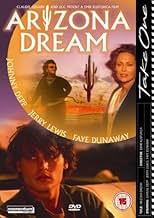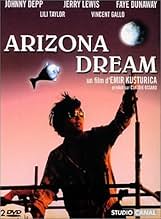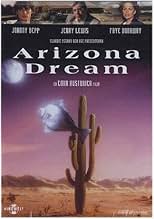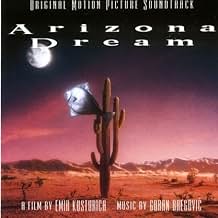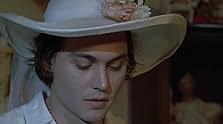CALIFICACIÓN DE IMDb
7.2/10
47 k
TU CALIFICACIÓN
Un joven neoyorquino se va a Arizona, donde encuentra la libertad para amar y soñar.Un joven neoyorquino se va a Arizona, donde encuentra la libertad para amar y soñar.Un joven neoyorquino se va a Arizona, donde encuentra la libertad para amar y soñar.
- Premios
- 4 premios ganados y 2 nominaciones en total
Polly du Pont Noonan
- Betty
- (as Polly Noonan)
James P. Morrison
- Boatman
- (as James P. Morrison II)
Opiniones destacadas
Some movies only work if we let ourselves carry away by them. They present a surrealistic imagination world that comes from the mind of their creators. They are hard to watch, especially when they mix real characters that live their lives sometimes awaken, or inside one big dream or their own dreams.
Axel Blackmar (Johnny Depp) is a dreamer, and an unusual example of personal choices. His parents died and he went to New York, to work with fish. He could have sold cars with his uncle Leo (Jerry Lewis), but he's there, talking with that monotonous voice about what he does. Maybe it was a simple dream, where an Eskimo catches a fish with two eyes on the same side, and tells his kids to go out with their dog so he and his wife can And the kid with the dog allow to see an orange balloon that seems to go from Alaska to New York, where Alex sleeps in a truck. "Wake up, Columbus", the words of his mother and Axel's hope to find something in the land already discovered by that man.
Alongside fish flying through the air, we join Axel to be the best man of his uncle's wedding. With his friend Paul Leger (Vincent Gallo), the untiring chats go from movies to philosophies about cakes, pies and bananas. Paul is an actor: "I'm having a great performance on Friday", he says. "It's an audition", Axel says to humiliate him. The truth is that it's not even an audition. This stuff lived by Axel is a story for us, but is a personal rediscovering and rethought of decisions in life for the character. When he sees Elaine (Faye Dunaway) he feels something strong, but doesn't know how to call it. Days later he becomes the lover of a woman decades older than him. Elaine's daughter, Grace (Lili Taylor) is also there, and it doesn't goes long until Axel finds himself in a crossroad between the heart of two women, that as he describes them, are "too similar and big to be in the same world".
David Atkin's story and screenplay comes plagued of phrases that could come out of a lunatic's mouth, but they fit in the film's context and twist your head at maximum. "I've got to climb It's a long way to the moon"; "I'm gonna live forever until I become a turtle They have infinite lives", besides scenes of well known movies in crucial moments. And what music (Goran Bregovic)! And what editing (Andrija Zafranovic)! And what cinematography (Vilko Filac)! And what director! Known for his originality, recognized director Emir Kusturica puts his own signature to his movie, collaborating in the story he must have dreamed a little to; giving life to the dream with his flying camera, full of unexpected turns and in love of its surroundings. What he achieves is greater words, although not everybody could understand it, and, for that matter, appreciate it.
And his actors Jerry Lewis in a total comprehension of his character, and so involved in his work that you wouldn't believe it. So incredibly likable in one of those roles we never give much importance to. Faye Dunaway Wow! She got to work with some of these actors later, but here, as an old woman in character and, with respect, in person, she maintains that virtue of creating uniqueness, with her laughs, smiles and way of saying things. Lili Taylor was the most interesting character here. The silent daughter that could be crazy but no one can really tell. With imagination and freedom, Taylor makes her character believable and not as overacted as it might be. Vincent Gallo, who I respect mostly as a director and as an actor that does what he wants, the ability he has had to choose his roles is visible here again; as he shines without lights to help him. A wonderful performance his fans shouldn't miss.
But Depp How can I explain? I've said it a lot, surely, but I will repeat it. He's like a magician, but not with the cards and the hat and the tricks. He is with his face, his looks, his way of talking, his perfection of movement But it's not really something technical: "in the acting world, Johnny Depp is a magician". I'm sure he still has plenty of that for us, but here is where he let us know first.
In one scene, Vincent Gallo's character Paul, an actor, requests that no one touches his face, because it's important. "Do you think they touch Brando's face? Do you think they touch Pacino's, De Niro's? Do you think they touch Johnny Depp's face? I don't know then, but not know; and if they did before, they shouldn't have.
Axel Blackmar (Johnny Depp) is a dreamer, and an unusual example of personal choices. His parents died and he went to New York, to work with fish. He could have sold cars with his uncle Leo (Jerry Lewis), but he's there, talking with that monotonous voice about what he does. Maybe it was a simple dream, where an Eskimo catches a fish with two eyes on the same side, and tells his kids to go out with their dog so he and his wife can And the kid with the dog allow to see an orange balloon that seems to go from Alaska to New York, where Alex sleeps in a truck. "Wake up, Columbus", the words of his mother and Axel's hope to find something in the land already discovered by that man.
Alongside fish flying through the air, we join Axel to be the best man of his uncle's wedding. With his friend Paul Leger (Vincent Gallo), the untiring chats go from movies to philosophies about cakes, pies and bananas. Paul is an actor: "I'm having a great performance on Friday", he says. "It's an audition", Axel says to humiliate him. The truth is that it's not even an audition. This stuff lived by Axel is a story for us, but is a personal rediscovering and rethought of decisions in life for the character. When he sees Elaine (Faye Dunaway) he feels something strong, but doesn't know how to call it. Days later he becomes the lover of a woman decades older than him. Elaine's daughter, Grace (Lili Taylor) is also there, and it doesn't goes long until Axel finds himself in a crossroad between the heart of two women, that as he describes them, are "too similar and big to be in the same world".
David Atkin's story and screenplay comes plagued of phrases that could come out of a lunatic's mouth, but they fit in the film's context and twist your head at maximum. "I've got to climb It's a long way to the moon"; "I'm gonna live forever until I become a turtle They have infinite lives", besides scenes of well known movies in crucial moments. And what music (Goran Bregovic)! And what editing (Andrija Zafranovic)! And what cinematography (Vilko Filac)! And what director! Known for his originality, recognized director Emir Kusturica puts his own signature to his movie, collaborating in the story he must have dreamed a little to; giving life to the dream with his flying camera, full of unexpected turns and in love of its surroundings. What he achieves is greater words, although not everybody could understand it, and, for that matter, appreciate it.
And his actors Jerry Lewis in a total comprehension of his character, and so involved in his work that you wouldn't believe it. So incredibly likable in one of those roles we never give much importance to. Faye Dunaway Wow! She got to work with some of these actors later, but here, as an old woman in character and, with respect, in person, she maintains that virtue of creating uniqueness, with her laughs, smiles and way of saying things. Lili Taylor was the most interesting character here. The silent daughter that could be crazy but no one can really tell. With imagination and freedom, Taylor makes her character believable and not as overacted as it might be. Vincent Gallo, who I respect mostly as a director and as an actor that does what he wants, the ability he has had to choose his roles is visible here again; as he shines without lights to help him. A wonderful performance his fans shouldn't miss.
But Depp How can I explain? I've said it a lot, surely, but I will repeat it. He's like a magician, but not with the cards and the hat and the tricks. He is with his face, his looks, his way of talking, his perfection of movement But it's not really something technical: "in the acting world, Johnny Depp is a magician". I'm sure he still has plenty of that for us, but here is where he let us know first.
In one scene, Vincent Gallo's character Paul, an actor, requests that no one touches his face, because it's important. "Do you think they touch Brando's face? Do you think they touch Pacino's, De Niro's? Do you think they touch Johnny Depp's face? I don't know then, but not know; and if they did before, they shouldn't have.
After watching Jim Jarmusch's Dead Man and Fredrick Thor Fredrickson's Cold Fever I knew that there was going to be a great pairing of acting abilities. This, of course, being that of Johnny Depp and Lili Taylor I was not disappointed. The film, at first, absorbs the viewer into a translucent though engaging tale of exploration into the mind and soul. This makes the viewer belive momentarily that the film that they are watching is going to be fanciful and mystic. Hence there at first is no bond between the characters and the Viewer. However, reality becomes less and less of a point or actuality in the film as it paces through the lives of the characters centering on Johnny Depp's charecter. An ifinitity is subconsiously drawn with him as we watch. Faye Dunnaway, who, at first, seemed utterly mis-cast is brilliant, her potrayal of the pre-menopausal cradle-snatcher is brilliant. Jerry Lewis also makes the film great as gritty realism exists in wealth. It feels like there is a piece of everyone in it, there is depression, love, life and death and the exploration of time. Although the film seems like a dream on celluloid it also makes the viewer understand and more importantly empathise with the charecters and at the end the sadness is alleviated by the theme of life, that life goes on, almost in circles. To anyone who has not yet been seriously touched by a film, watch this. It might change you're mind. 10/10 p.s. Watch for the balloon scene at the beginning!
10Rosear
It's very rare that I see a movie that is truly, in all aspects, perfect.
For example, while The Princess Bride ranks pretty high on my list of movies I'd want to spend the rest of my life watching, I fully realize that the camera angles and special effects of that movie are just plain bad. And while Fear & Loathing In Las Vegas gets a perfect 10 from me, it still completely lacks plot. And so on.
Arizona Dream, however, is different.
The last movie I saw that was truly, in all aspects, perfect was Dog Day Afternoon, a 1975 true story starring Al Pacino and Chris Sarandon. For the longest time, it's been my obsession, my movified bible, everything other movies should aspire to be. And as of today, Dog Day Afternoon finally has competition in my personal top ten: Emir Kusturica's masterpiece very near surpasses Lumet's vision of captivating dialogue, insane details, and dodgy man-groping.
Let's change the subject for a bit. Do you know the scene in Gilliam's Twelve Monkeys, where Bruce Willis is in his cage, and a hamster is running inside a wheel in the corner? Don't say yes, because you don't. It's inaudible. It's impossible to see. But it's there. Kusturica, much like Gilliam, is willing to make his world more detailed than your wildest dreams. His backgrounds are filled with symbolism and surrealism, his dark corners filled with soft puppies. And like Gilliam, he can make you cry with laughter, your only worry in the world being, 'how will I remember all these great quotes in the morning?'
But unlike Gilliam, Kusturica has the power to, barely a scene after the happy happy joy, make you sit there in stunned silence, your number one worry in the world being, 'how will I get my brain to understand the sheer tragedy that is unfolding here?'. Your will find yourself thinking, 'how do I get my mind to comprehend how perfectly this music fits the dialogue?'. Your eyes will follow the camera angles, the expressions of the insanely lovable characters, the many things happening in foreground and background-and you know, you just KNOW, that you will have to watch the movie again, and again, and again.
If you're a fan of movies such as Big Fish and Amélie, movies about people finding happiness and warmth in a world of surreal ambition, Arizona Dream will be your next obsession. But even if you think massive explosions and a grunting Bruce Willis are the only thing that can make a movie worth watching, you will still want to give this movie a chance- for the 'explosions' it causes will far, far surpass anything you've EVER experienced before.
10/10.
For example, while The Princess Bride ranks pretty high on my list of movies I'd want to spend the rest of my life watching, I fully realize that the camera angles and special effects of that movie are just plain bad. And while Fear & Loathing In Las Vegas gets a perfect 10 from me, it still completely lacks plot. And so on.
Arizona Dream, however, is different.
The last movie I saw that was truly, in all aspects, perfect was Dog Day Afternoon, a 1975 true story starring Al Pacino and Chris Sarandon. For the longest time, it's been my obsession, my movified bible, everything other movies should aspire to be. And as of today, Dog Day Afternoon finally has competition in my personal top ten: Emir Kusturica's masterpiece very near surpasses Lumet's vision of captivating dialogue, insane details, and dodgy man-groping.
Let's change the subject for a bit. Do you know the scene in Gilliam's Twelve Monkeys, where Bruce Willis is in his cage, and a hamster is running inside a wheel in the corner? Don't say yes, because you don't. It's inaudible. It's impossible to see. But it's there. Kusturica, much like Gilliam, is willing to make his world more detailed than your wildest dreams. His backgrounds are filled with symbolism and surrealism, his dark corners filled with soft puppies. And like Gilliam, he can make you cry with laughter, your only worry in the world being, 'how will I remember all these great quotes in the morning?'
But unlike Gilliam, Kusturica has the power to, barely a scene after the happy happy joy, make you sit there in stunned silence, your number one worry in the world being, 'how will I get my brain to understand the sheer tragedy that is unfolding here?'. Your will find yourself thinking, 'how do I get my mind to comprehend how perfectly this music fits the dialogue?'. Your eyes will follow the camera angles, the expressions of the insanely lovable characters, the many things happening in foreground and background-and you know, you just KNOW, that you will have to watch the movie again, and again, and again.
If you're a fan of movies such as Big Fish and Amélie, movies about people finding happiness and warmth in a world of surreal ambition, Arizona Dream will be your next obsession. But even if you think massive explosions and a grunting Bruce Willis are the only thing that can make a movie worth watching, you will still want to give this movie a chance- for the 'explosions' it causes will far, far surpass anything you've EVER experienced before.
10/10.
"Arizona Dream" is a real UFO but the kind of UFO we want to be taken to whatever universe it would lead us to. That's pure cinematic escapism, in fact, pure cinema.
"Arizona Dream" is strange and that might be the only objective point for critics and praises to converge to. And I've got to speak for myself, the film is so hypnotic and enchanting that I can't imagine how it can ever be criticized, so this is a positive review, yes, because Hollywood is so dry on experiences like "Arizona Dream" that such movies deserve admiration.
What's the story about? It's a tale about fishes, or one fish actually, a fish and a young man named Axel (Johnny Depp) who has strange dreams involving Eskimos and again, fishes ... I could go on and on, but the point is that all the plots and subplots I will enumerate will sound disjointed while they're so connected to the whole reverie that there's a weird feeling of coherency. The film transports us from one state to another (any meaning of state) without finding us questioning the reason. It doesn't make sense yet it does in the sense that it absorbs all your senses, like a real dream would do actually.
And it doesn't come as a surprise that it's Emir Kusturica, perhaps the European heir of Fellini, who could translate a dream-like vision into a quite-easy-to-follow movie. Any other director would have added some black and white photography, some hallucinatory moments, some non-sequitur elements to better highlight the pointlessness of a plot. Kusturica's directing is not only confident about our attention but attentive about our degree of involvement. It knows when it needs to focus on something tangible and meaningful, and it knows when to throw all the conventions out and float above them, when to act and when to improvise. Even dreams can be codified, even reality needs to loosen up.
Again, what's the film about? Well, this is a film about relationships, some dramatic as the song says, it's about encounters that suddenly gives a total meaning to someone's life or seals the fates of others. Axel's uncle (Jerry Lewis) feels guilty for the loss of his nephew's parents and want him to work for him in his Cadillac-selling business, Elaine (Faye Dunaway) is a woman who dreams of flying, Paul (Vincent Gallo) wants to be an actor, Elaine's daughter Grace (Lily Taylor) a turtle. Realistic or crazy, we're all defined by a quest, a secret will. And these quests always find a root in the past or some dream, whether the past defines the dream or the dream shapes the future might paint the essence of the present.
I don't think it goes further than that, trying to find other meanings would mean entrapping this film in a rational box while there is more to enjoy besides depth. Like a Kusturica movie, this film has a lot of music going on, a lot of accordion, a lot of dancing and loving, of passion and pathos, even jealousy and envy are powerfully conveyed by the performance of the two peripheral characters played by Taylor and Gallo, while Depp and Dunaway can abandon themselves in an ocean of lust and fully enjoy their romance until they learn to deal with the consequences. How weird that you could feel the word "deep" in Depp and Faye Dunaway almost rhymes with "fly" and "runaway".
And as a leitmotif, we have this flying fish caught earlier by an Eskimo who belongs to either a dream or a reality, to say that it makes the connection between the opening scene and the rest of the film or the rest of the film with the ending scene is beside the point, if there's any, yet, there's a feeling of completeness, the idea that sometimes, we all have a vision of what we should do and what shall become of us. If the Eskimo metaphor is right, so maybe whatever the protagonists wish to happen to them after they die, will indeed happen... because maybe that's what Heaven is about.
Why would Uncle Leo be so sure he'd meet Axel's parent if he died? It doesn't really matter because at that moment, we've embraced the film's magic and we believe he does. Later, Axel says to Grace that he used to love her mother but then she became a cloud he could see through and realized he loved her. Axel is crazy in the way he sticks to his vision but so does everyone. In another scene meant for laughs, Paul impersonates Cary Grant in the famous plane scene of "North by Northwest", from our perspective, with the images of the original film, it's a masterstroke of impersonation, for the audience, his motionlessness is ridiculous. Does it matter again? No. Paul believes in his talent. And Kusturica opens our eyes about it.
And that might be the 'point' after all. The most remembered part from the film is the flying sequence and the unforgettable "Death Car" song from Iggy Pop and Goran Bergovic, the score contains many more haunting musical gems saying in musical language that heaven isn't in our visions, but in their fulfillments. That might be what film-making is about, it starts with a vision and the rest is just poetry in motion. Kusturica is aware than he's privileged for making such movies, which would be impossible today.
But he had this luck to come at Hollywood at the right time, the right moment, to have Johnny Depp before he became a supreme movie star, Faye Dunaway who was always "in" for ambitious projects ("Mommie Dearest" was a blessing in disguise as it allowed her to work in weird but fascinating movies like this or "Barfly") and Lewis, Gallo, Taylor complete the gallery of eccentric but appealing protagonists, I mentioned Fellini but there's something weirdly Hustonian in that bunch of dreaming misfits.
And something unique about Kusturica, as usual...
"Arizona Dream" is strange and that might be the only objective point for critics and praises to converge to. And I've got to speak for myself, the film is so hypnotic and enchanting that I can't imagine how it can ever be criticized, so this is a positive review, yes, because Hollywood is so dry on experiences like "Arizona Dream" that such movies deserve admiration.
What's the story about? It's a tale about fishes, or one fish actually, a fish and a young man named Axel (Johnny Depp) who has strange dreams involving Eskimos and again, fishes ... I could go on and on, but the point is that all the plots and subplots I will enumerate will sound disjointed while they're so connected to the whole reverie that there's a weird feeling of coherency. The film transports us from one state to another (any meaning of state) without finding us questioning the reason. It doesn't make sense yet it does in the sense that it absorbs all your senses, like a real dream would do actually.
And it doesn't come as a surprise that it's Emir Kusturica, perhaps the European heir of Fellini, who could translate a dream-like vision into a quite-easy-to-follow movie. Any other director would have added some black and white photography, some hallucinatory moments, some non-sequitur elements to better highlight the pointlessness of a plot. Kusturica's directing is not only confident about our attention but attentive about our degree of involvement. It knows when it needs to focus on something tangible and meaningful, and it knows when to throw all the conventions out and float above them, when to act and when to improvise. Even dreams can be codified, even reality needs to loosen up.
Again, what's the film about? Well, this is a film about relationships, some dramatic as the song says, it's about encounters that suddenly gives a total meaning to someone's life or seals the fates of others. Axel's uncle (Jerry Lewis) feels guilty for the loss of his nephew's parents and want him to work for him in his Cadillac-selling business, Elaine (Faye Dunaway) is a woman who dreams of flying, Paul (Vincent Gallo) wants to be an actor, Elaine's daughter Grace (Lily Taylor) a turtle. Realistic or crazy, we're all defined by a quest, a secret will. And these quests always find a root in the past or some dream, whether the past defines the dream or the dream shapes the future might paint the essence of the present.
I don't think it goes further than that, trying to find other meanings would mean entrapping this film in a rational box while there is more to enjoy besides depth. Like a Kusturica movie, this film has a lot of music going on, a lot of accordion, a lot of dancing and loving, of passion and pathos, even jealousy and envy are powerfully conveyed by the performance of the two peripheral characters played by Taylor and Gallo, while Depp and Dunaway can abandon themselves in an ocean of lust and fully enjoy their romance until they learn to deal with the consequences. How weird that you could feel the word "deep" in Depp and Faye Dunaway almost rhymes with "fly" and "runaway".
And as a leitmotif, we have this flying fish caught earlier by an Eskimo who belongs to either a dream or a reality, to say that it makes the connection between the opening scene and the rest of the film or the rest of the film with the ending scene is beside the point, if there's any, yet, there's a feeling of completeness, the idea that sometimes, we all have a vision of what we should do and what shall become of us. If the Eskimo metaphor is right, so maybe whatever the protagonists wish to happen to them after they die, will indeed happen... because maybe that's what Heaven is about.
Why would Uncle Leo be so sure he'd meet Axel's parent if he died? It doesn't really matter because at that moment, we've embraced the film's magic and we believe he does. Later, Axel says to Grace that he used to love her mother but then she became a cloud he could see through and realized he loved her. Axel is crazy in the way he sticks to his vision but so does everyone. In another scene meant for laughs, Paul impersonates Cary Grant in the famous plane scene of "North by Northwest", from our perspective, with the images of the original film, it's a masterstroke of impersonation, for the audience, his motionlessness is ridiculous. Does it matter again? No. Paul believes in his talent. And Kusturica opens our eyes about it.
And that might be the 'point' after all. The most remembered part from the film is the flying sequence and the unforgettable "Death Car" song from Iggy Pop and Goran Bergovic, the score contains many more haunting musical gems saying in musical language that heaven isn't in our visions, but in their fulfillments. That might be what film-making is about, it starts with a vision and the rest is just poetry in motion. Kusturica is aware than he's privileged for making such movies, which would be impossible today.
But he had this luck to come at Hollywood at the right time, the right moment, to have Johnny Depp before he became a supreme movie star, Faye Dunaway who was always "in" for ambitious projects ("Mommie Dearest" was a blessing in disguise as it allowed her to work in weird but fascinating movies like this or "Barfly") and Lewis, Gallo, Taylor complete the gallery of eccentric but appealing protagonists, I mentioned Fellini but there's something weirdly Hustonian in that bunch of dreaming misfits.
And something unique about Kusturica, as usual...
Yugoslavian director Emir Kusterica is most well known for his critically acclaimed international films like "Time of the Gypsies" and "Underground"(1995). He did one English language film in Ameica. The film "Arizona Dream" is a highly underrated film that people have seem to forgotten. Which is a shame, since it has an amazing cast of well known actors like Johnny Depp, Vincent Gallo, Faye Dunaway, Jerry Lewis and Lili Taylor. Jonny Depp plays Axel a young twenty something dreamer. In the beginning of the film he has a dream about an Eskimo family. He works at a dock cleaning fish and often drifts away from reality to dreams. Him and his friend Paul (Vincent Gallo) drive to Arizona to visit Axel's uncle Mr. Sweetie (Jerry Lewis)who's a car salesman. I must say Depp and Lewis make a great comic duo. Axel and Paul end up staying with the wealthy Elaine Stalker and her suicidal daughter Grace (Lili Taylor). Axel starts dating Mrs. Stalker, but at the same time has strange feelings for her daughter. The film is very surreal and dreamlike. Mrs. Stalker obsessively dreams of flying, so her and Axel build a flying machine that resembles a Right Brothers style airplane. It's hilarious when the plain repeatedly malfunctions. There's also a floating fish throughout the movie, turtles, an attempted pantie hose suicide and a weird sex scene where Jonny Depp crows like a rooster (must be seen to be believed). Warner Bros. felt that the film was too European. So the film collected dust on their shelf and had a poor limited release. The film does have a magic-realist tragi-comedy style like Emir Kusterica's other Eastern European films. Co writer David Atkins later went on to write the screenplay for Novacaine. Also producer Claudie Ossard has also helped produce other bizarre films like "City of Lost Children". "Arizona Dream" is a quirky and strange masterpiece. Track down a VHS copy, or better yet the 20 minute longer international version. It's quite a cult sensation in Europe.
¿Sabías que…?
- TriviaThe first cut of the film was about four hours long. Emir Kusturica gave Johnny Depp a copy of the version.
- ErroresSince the movie took about a year to shoot, Axel's hair length changes drastically throughout the film. In the beginning, when he talks to Paul up until when they arrive at Leo's house, his hair is longer than in the next few scenes when he spends time with his uncle. It's long again when he starts staying at Elaine's house.
- Citas
Axel Blackmar: But what's the point of breathing if somebody already tells you the difference between an apple and a bicycle? If I bite a bicycle and ride an apple, then I'll know the difference.
- Créditos curiososThe end credits read: "Any reference to Cadillac dealerships or dealers is purely fictional. The Cadillac automobile was selected for the film because it was and continues to represent the epitomy (sic) of American automobile design."
- Versiones alternativasOriginally released in Europe at 142 minutes. The USA version was cut down to 119 minutes but the complete version was also released theatrically. Only the short version is available on video in the USA.
- ConexionesFeatured in Rango (2011)
Selecciones populares
Inicia sesión para calificar y agrega a la lista de videos para obtener recomendaciones personalizadas
- How long is Arizona Dream?Con tecnología de Alexa
Detalles
- Fecha de lanzamiento
- Países de origen
- Idiomas
- También se conoce como
- The Arrowtooth Waltz
- Locaciones de filmación
- Productoras
- Ver más créditos de la compañía en IMDbPro
Taquilla
- Presupuesto
- USD 19,000,000 (estimado)
- Total en EE. UU. y Canadá
- USD 112,547
- Fin de semana de estreno en EE. UU. y Canadá
- USD 6,887
- 11 jun 1995
- Total a nivel mundial
- USD 112,547
- Tiempo de ejecución
- 2h 22min(142 min)
- Color
- Mezcla de sonido
- Relación de aspecto
- 1.85 : 1
Contribuir a esta página
Sugiere una edición o agrega el contenido que falta


